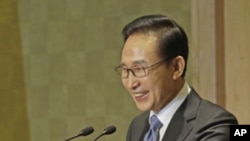South Korean President Lee Myung Bak travels to Washington this week for talks with top U.S. officials. The stalled negotiations with North Korea over its nuclear program and a pending free-trade agreement between the two countries are expected to be at the top of the agenda.
Restarting North Korean nuclear talks
After visiting Seoul last week, U.S. Assistant Secretary of State Kurt Campbell said North Korea has tried to create tensions between Washington and Seoul over the stalled nuclear talks. But he says Washington and Seoul are in firm agreement about the path forward.
"We've never been closer. And, we have orchestrated and cooperated in every aspect of our diplomacy with respect to North Korea. And, we share a very clear determination that we are only interested in serious efforts on the part of North Korea. We will not resume a diplomatic path that has failed in the past," he said.
In 2009, North Korea walked away from negotiations with South Korea, China, Japan, Russia and the United States. Pyongyang then tested its second nuclear device.
The U.S. and South Korea want the north to freeze its uranium enrichment activities and allow inspectors at all nuclear sites before the talks can resume. Pyongyang says it will not return to dialogue unless these requests are dropped.
Daniel Pinkston, an analyst at the International Crisis Group in Seoul, says Presidents Lee and Obama are unlikely to back off their demands during their talks in Washington.
"To return to the talks without some guarantees that North Korea is going to take some steps to freeze the program or do something to help the talks move forward, that would be very politically risky. The leadership in Washington and Seoul would be criticized of going back to the talks without achieving anything," he said.
Free-trade agreement, a contentious issue
The other major issue during Lee’s visit is the free-trade deal between the two countries that has awaited approval since 2007.
A vote in the United States Congress is expected this week (Wednesday). But KORUS-FTA, as its known, still needs legislative approval from politicians in Seoul.
Seong Young-gwan is a research fellow at the government-funded Korea Development Institute in Seoul. He says even though the ruling party has the votes to force the deal through parliament, it is important to get support from opposition lawmakers.
"Without the consensus from the opposition parties, if the Grand National Party just pushes the ratification it will foster anti-American sentiment and subsequent protests, so politically there is some danger about that," said Seong Young-gwan.
Seong says if ratified, the trade pact may hurt Korea’s agricultural sector, but provide a boost for manufacturers.
Others are more skeptical. Nam He-Sob is with the Korea Alliance Against the KORUS FTA. Nam points to the North American Free-Trade Agreement, NAFTA, as an example of how these deals do not help workers.
"I think this deal may boost some more exports from Korea to the United States but I am not sure if this leads to the extension of employment. Since the NAFTA went into force in the U.S., the U.S. has experienced massive job loss in the manufacturing sectors. We have seen in this country that the growth of some exporting corporations does not mean more jobs, more wages or a better quality of life for the general public," said Nam.
Amy Jackson, president of the American Chamber of Commerce in Seoul, says she understands Nam’s protests but thinks that overall, the agreement will be mutually beneficial.
"I think one of the issues that all governments have to address in implementing trade agreements is that while the vast majority of society that is a winner, there are pockets of society that will suffer negative consequences of a free trade agreement. And I think it’s up to the governments to develop some policies to address the needs of those parts of the population," she said.
Economic and security partnership
Jackson says the KORUS FTA would enhance the two countries’ already strong economic and security partnership. She adds it also could help the American economy regain some strength after its recent decline.
But activist Nam Hee-sob says many Koreans see the troubles in the American economy as a warning to stay away.
"Especially younger generations believe that this outcome is an unacceptable humiliation and an overly high price to pay for America’s role in providing our national defense. In terms of long-term relationship between the two countries, this deal might do more harm than good," said Nam.
Nam says his organization and other anti-free trade activists will hold daily protests and put pressure on lawmakers here not to ratify the trade deal.
Nuclear, Trade Issues to Dominate S. Korea's President US Agenda




